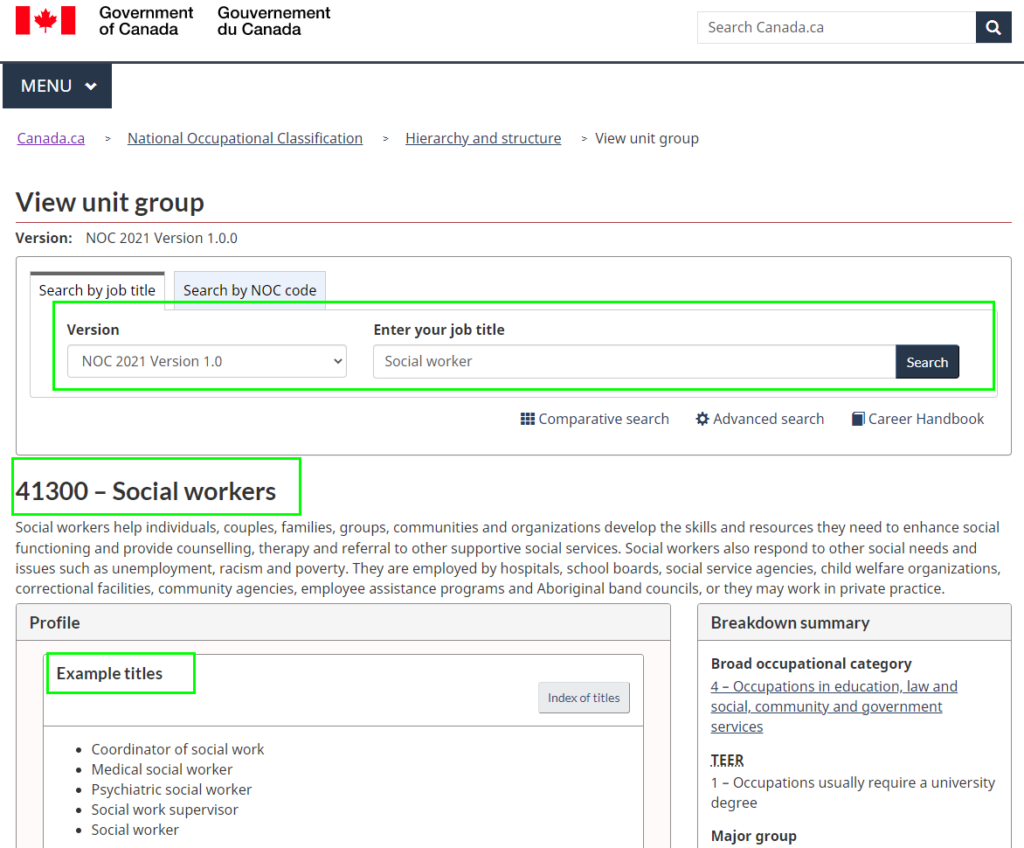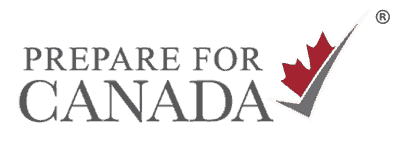
Social worker jobs remain a good career choice in Canada. Social workers play an important role in assisting people in many different settings such as schools, hospitals, health clinics, and government-run social programs. If you have international experience working as a social worker, you’ll need to meet certain qualifications to work in Canada. These qualifications can help you improve your standing, get a better job, and even find a higher social worker salary. If you’d like to continue your social work career in Canada, find out more about requirements, licensing, job search techniques, and even the salary of a social worker in Canada.
There are specific job requirements and qualifications that you must have to work in the field of social work in Canada. And to find a job, it’s vital to know the employment and social work job requirements in Canada. Learn how to prepare for a social worker job in Canada by reading this helpful overview.
Contents:
- How to Immigrate to Canada as a Social Worker
- What to Expect When Pursuing a Social Worker Career in Canada
- Requirements to Become a Social Worker in Canada
- Upgrading Your Skills to Meet Social Worker Job Requirements
- Bridging Programs for Social Worker Careers in Canada
- Social Worker Schools in Canada
- Social Work Associations in Canada
- How Much Do Social Workers Make in Canada?
- Best Provinces to Work in Canada Based on Social Worker Salary & Lifestyle
- Pursuing Social Worker Careers in Canada
- Job Search Techniques for Social Workers in Canada
How to Immigrate to Canada as a Social Worker
It’s essential you research the social work profession before you come to Canada. Requirements to be a social worker may be different than your home country. There are different skills, qualifications, and expectations. You can save time making the transition when you move to Canada when you know what to expect.
Fortunately, there are steps that you can take before you immigrate to improve your chances of practicing social work in Canada.
Before You Move to Canada to Pursue a Social Worker Career
Advertisement:
To achieve social worker career success, it’s important to understand the skills that the Canadian labour market requires. And you need to know if your international qualifications will meet the social work job requirements. To learn what you require to work as a social worker in Canada, you can take these preliminary steps:
- Contact the provincial association that regulates social workers in the province where you plan to settle in Canada.
- Learn what licensing procedures to complete before and after you move to Canada.
- Find out what documents you need to bring to Canada and verify if they need to be translated. You might need to use a professional translation service in Canada.
- Gather your education, work, and identity documents when in your home country.
- Learn about social worker salary scale, compensation, and benefits options.
- Improve your language skills and enroll in language classes in your home country and continue them after you move to Canada. You’ll need to prove your English or French (depending on your destination province) language competency or be tested.
- Assess your language skills by taking on an online self-assessment on the Centre for Canadian Language Benchmarks website.
- Learn about social work job requirements and become familiar with provincial laws and legislation that regulate the field.
- Know the name of your job in Canada and make a list of potential employers.

What to Expect When Pursuing a Social Worker Career in Canada
Social work is a regulated profession in all provinces in Canada. And, only those who meet the standards set by the provincial regulatory bodies can use the titles of “Social Worker” and “Registered Social Worker.” These bodies issue licenses or certificates to individuals who meet their registration requirements.
The Canadian Association of Social Workers (CASW) is the national organization that represents social workers from across Canada. You need to apply directly to the appropriate provincial regulatory authority to become licensed as a social worker or registered social worker in Canada.
Before You Move to Canada to Pursue a Social Worker Career
Understanding the current status of social work jobs and career opportunities is an important thing to understand before moving. Labour market conditions change over time.
As of 2021, there are about 68,000 people working in this field. According to the Government of Canada’s Job Bank, the supply and demand for social work jobs are balanced currently and this trend is expected to continue until 2031. This means, there could be much competition for jobs. As an international applicant, you’ll need to have strong qualifications and experience.
Advertisement:
Start Your Research with the NOC Code for Social Worker Jobs in Canada
The National Occupational Classification (NOC) is Canada’s reference to occupations. You can use this tool to find social worker (NOC 41300) job requirements and labour market information. It’s a helpful place to start researching the social work occupation in Canada.
Social workers may have job titles such as:
- Coordinator of social work
- Medical social worker
- Psychiatric social worker
- Social work supervisor or
- Clinical social worker.

The Canada Job Bank is another useful tool to learn more about your profession in Canada. Find out more at Canada Job Bank: Your Vital Research Tool.
Requirements to Become a Social Worker in Canada
Social workers in Canada, including those who are internationally trained must meet certain academic and professional standards. You’ll need to meet the education, work experience, and certification needs of the job based on provincial standards. Below are the steps to follow to work as a social worker in Canada:
Credential Recognition to Meet Social Worker Job Requirements in Canada
One of the first things to do is to learn the employment and job requirements to work as a social worker in Canada. This will help you to understand if you meet the job requirements, or if you must take steps to meet the requirements. This could include getting recognition for your credentials.
To find out what you need, you can contact the regulatory body in the province or territory where you intend to settle in Canada. They will advise you on what documents and assessments you require. You may have to submit:
- Original diplomas, degrees, or full transcripts recording your course and marks, and the official program syllabuses or course descriptions
- Names and addresses of the schools you attended and obtained your social work qualifications
- Employment and character references
- Work descriptions and letters from professional agencies.
All documents must have certified English or French translation (depending on the province).
Contact the professional association in the province or territory you will settle in before you move to get more information about the schedule of exams and consider that when deciding the actual date of your departure to Canada.
It’s important to know and understand the licensure procedure and what the regulatory body expects from you. So be sure to take time to complete the application process properly. The Canadian Association of Social Workers (CASW) assesses your credentials. Learn more about the CASW application procedure The CASW assessment is accepted in all Canadian provinces, except for British Columbia and Quebec. These two provinces have their own assessment process.
Credential Assessment Services
If you plan to enroll in a college or university program to upgrade your skills, you may need an education evaluation. You can contact the school you plan to attend to find out what credential assessment agency you should use and the steps to follow.
Make sure to showcase your international education and skills. As well, build on your existing knowledge and skills and explore university and college options thoroughly before deciding. You might be able to have advanced standing, transfer some of your credits, and benefit from prior learning assessment options by using your international credentials and experience to gain credit or course exemptions. This way you will complete your program more quickly, without wasting money and repeating the education you already have.
Some options to consider are:
World Education Services (WES) – Ontario
International Qualifications Assessment Service (IQAS) – Alberta
The International Credential Evaluation Service (ICES) – British Columbia
Learn how education evaluation and credential recognition differ with this helpful infographic.
Upgrading Your Skills to Meet Social Worker Job Requirements

In addition to accreditation, you may have to upgrade your skills to meet social work job requirements and get a job. So, you may have to:
- Take courses
- Enroll in a bridging program, or
- Upgrade your language skills to become a certified social worker.
Canadian employers expect social workers to have strong professional ethics, computer skills, and the ability to work in difficult situations. And equally important are your soft skills such as empathy, understanding, and communication skills. These skills can also help you increase your social worker’s salary.
Language Training for Social Workers in Canada
Having strong skills in one or both of Canada’s official languages – English or French –is extremely important for your future in Canada. Whether you choose to focus on learning or improving English or French will depend on which of the two languages most people speak in the area where you live.
You may be eligible for Language Instruction for Newcomers to Canada (LINC) program. As well, many settlement agencies offer free English as a Second Language (ESL) or French as a Second Language (FSL) classes.
There are even language courses to teach you professional terminologies, such as job-specific language training and Occupation Specific Language Training (OSLT) in Ontario. And, if you already speak one of Canada’s two official languages at a high level, learning the other one is a good idea. and it may offer you more employment options.
Bridging Programs for Social Worker Careers in Canada
Bridging programs are a good way to transition from your international experience and training to the Canadian workplace. Though there are not many bridging programs for internationally trained social workers, many colleges, universities, and immigrant-serving agencies offer courses or workshops related to the social work sector. You may be eligible for one. Do some research to find a program that’s suitable for you based on your social worker career aspirations.
Toronto Metropolitan University offers the Internationally Educated Social Work Professionals (IESW).
This program helps internationally educated social work professionals to work in their field in Ontario. Program participants can access training, workplace experience, employment support, and an occupation-specific communications course. In addition, this program will develop a peer support program for the effective workplace integration of participants.
In Alberta, you can upgrade your qualifications through the Alberta College of Social Workers (ACSW).
Social Worker Schools in Canada
Most Canadian colleges and universities offer a social work program. These programs are offered at the undergraduate and graduate levels with a number of areas of specialization. Some of the top schools for social work education in Canada are:
- University of Windsor
- Carleton University
- Toronto Metropolitan University (TMU)
- University of Northern British Columbia (UNBC)
- University of Regina
- Western University
- University of Manitoba
- Dalhousie University
- McMaster University
- Simon Fraser University
Learn more about the social work programs offered by these schools by checking out program offerings on the university’s website.
Social Work Associations in Canada
Each Canadian province has its own regulatory body to license social workers. Each body governs the social work profession and ensures members meet professional standards. The associations listed below can provide information about licensure and certification and offer professional development, education, and networking opportunities.
National Social Work Associations in Canada
Canadian Association of Social Workers (CASW)
Canadian Association of Social Work Education (CASWE)
Provincial Social Work Regulators in Canada
Alberta College of Social Workers (ACSW)
British Columbia College of Social Workers (BCCSW)
Manitoba College of Social Workers
New Brunswick Association of Social Workers
Nova Scotia College of Social Workers
Newfoundland and Labrador College of Social Workers
Ontario College of Social Workers and Social Service Workers (OCSWSSW)
Prince Edward Island Association of Social Workers
Ordre des travailleurs sociaux et des thérapeutes conjugaux et familiaux du Québec
Saskatchewan Association of Social Workers
British Columbia Association of Social Workers
The Association of Social Workers of Northern Canada (ASWNC)
Professional Immigrant Networks
Professional immigrant networks (PINS) are volunteer-run member-based associations or networks created by and for immigrant professionals. PINS exists to:
- create a forum to contribute to and enrich their respective communities
- provide opportunities for members to find employment and achieve their professional goals.
PINs organize networking events, mentoring, and job information sessions. As well, they provide professional development workshops, training, and connections to job opportunities.
While PINS may not exclusively serve the social work sector, they may have social workers among their membership:
In Nova Scotia
Immigrant Services Association of Nova Scotia (isans) helps newcomer professionals with economic and social integration in the province of Nova Scotia.
In Ontario
Chinese Professionals Association of Canada
Javeriana University Professional Alumni Association in Canada
Mississauga Mandarin Association
How Much Do Social Workers Make in Canada?

Social worker salaries can range between $22 and $59 per hour. A full-time job working 40 hours per week could earn a social worker salary between $45,760 and $122,720 per year. The average hourly wage for a social worker in Canada is $36 per hour ($74,880 per year).
The region with the highest average hourly rate is Northwest Territories and the province with the lowest hourly wage is New Brunswick. Where you choose to live will play a big role in your social worker’s salary.
Social Worker Salary in Canada
The salary of a social worker in Canada can vary based on your level of experience, skills, and knowledge. Using the information from the Canada Job Bank, you can research how much you can expect to earn in different cities and provinces across Canada. For your reference, here are the most recent social worker salary numbers in Canada (as of November 2022):
| PROVINCE | LOW ($/HOUR) | MEDIAN ($/HOUR) | HIGH ($/HOUR) |
|---|---|---|---|
| National | 24.00 | 36.00 | 47.50 |
| Alberta | 22.84 | 38.00 | 49.15 |
| British Columbia | 26.42 | 40.00 | 45.79 |
| Manitoba | 23.00 | 34.89 | 46.00 |
| New Brunswick | 22.35 | 34.80 | 40.30 |
| Newfoundland and Labrador | 25.67 | 38.46 | 46.50 |
| Northwest Territories | 27.64 | 48.73 | 59.63 |
| Nova Scotia | 23.08 | 35.64 | 46.43 |
| Nunavut | N/A | N/A | N/A |
| Ontario | 23.08 | 35.90 | 49.74 |
| Prince Edward Island | 24.04 | 35.90 | 41.42 |
| Quebec | 24.00 | 35.00 | 45.22 |
| Saskatchewan | 26.33 | 38.00 | 43.00 |
| Yukon | 32.12 | 40.83 | 50.00 |
Best Provinces to Work in Canada Based on Social Worker Salary & Lifestyle
There are thousands of social organizations across Canada that employ social workers. However, it’s best to research the labour market to determine what provinces and cities have the greatest demand for social workers. You’ll have better success finding a job in the cities with a high demand for your skills and experience.
According to the Canadian Occupation Projections Systems, job prospects are good in many provinces including New Brunswick, Nova Scotia, Ontario, Prince Edward Island (PEI), Quebec, Yukon Territory, and Nunavut.
Pursuing Social Worker Careers in Canada
Becoming a social worker in Canada follows a similar path as many other professions. You need the right academic credentials, relevant work experience, and a plan for where you want to work within the country. Below is valuable information to help you pursue a social worker in Canada:
Major Employers for Social Worker Jobs in Canada
Social workers can find employment in many organizations in Canada. Here’s a general list of places where social workers can work:
- Family service agencies
- Social housing agencies
- Hospitals
- School boards
- Welfare administration agencies
- Child welfare agencies
- Community health centres
- Employee assistance programs
- Addiction services and government departments
- Private practice.
You can view a directory of Canadian organizations and job postings in the social sector by visiting Charity Village. The directory contains information about the non-profit sector in Canada. You can also learn about the companies that hire recent immigrants by visiting Canada’s Best Diversity Employers website. These employers offer programs to help newcomers transition to a new workplace and a new life in Canada.

Job Search Techniques for Social Workers in Canada
Searching for a job in Canada may be different than how you would find a job in your home country. The Canadian job market is competitive, and it can be hard to find a job. And, it can take some time to find full-time work as a social worker, so you need to understand how to find a job and prepare for your job search.
Many settlement agencies can help you with your job search. For example, they can help you to broaden your search, identify other career options, or even other locations to consider. As well, they can suggest job-finding or networking groups in the social work field that you could join. Other job search techniques include:
- Attending career/job fairs, info sessions, and conferences related to the social sector
- Volunteering with social agencies and centres in your community
- Seeking a mentor in the social work sector who could give you insight and advice about working in Canada.
Find out how a mentor can help you succeed.
Use Immigrant Settlement Agencies to Find Social Worker Jobs
Most settlement agencies can help you to:
- Find job vacancies
- Update your resume and cover letter
- Prepare for interviews, and
- Understand social work job requirements in Canada and what Canadian employers look for.
Click the link to find immigrant services in your area.
Informational Interviews to Gain Understanding of Job Requirements in Canada
An informational interview is a brief (20–30 minute) meeting with someone in your field. The purpose of the meeting is to learn more about working in the field in Canada. You can also use this interview to gain an understanding of the social work job requirements.
You should not try to get a job during an informational interview. Instead, you want to explore whether a particular position or employer might be a good fit for your interests, skills, and knowledge. An informational interview with a contact from your network can be a helpful source of career information.
Networking for Social Worker Careers
Networking is an essential tool that may give you job leads, and offer you advice and information about a particular company or industry that can strengthen your resume, cover letter, and interview skills. As many job vacancies are not advertised, you must make connections with working social workers and others within your field.
Good places to network include conferences, associations, and social mixers to meet people, build relationships, and share information.
LinkedIn is another important professional tool for networking. It is great for reconnecting with former colleagues and employers, searching by company or jobs, and getting introductions and recommendations.
You can also mingle with people in the social sector and join some related professional groups.
Note that it’s not appropriate to ask a networking contact for a job, but if they know of any job leads, they may share them.
Remember, it takes time to cultivate and grow the ties you establish through networking. Nothing will happen overnight and therefore, you need to be patient. Get more great tips for successful networking:
Writing your Social Work Resume

A degree in social work can lead to finding a job as a counsellor, admissions adviser, case manager, and management and director positions. Here are some helpful resume-writing tips:
Write a Functional Resume
To get an interview for any social work position, you need to tailor your resume to the specific position you want. A functional resume works best for social workers. If you have experience working with at-risk children and adults with substance abuse problems, you can group your skills and experience to show the group that you worked with rather than your chronological work history.
Find out more about writing your resume:
Include a Statement of Objective
When writing your resume for a social work position, include your statement of objective at the top. This will help frame your social worker career goals.
Align Your Resume with Agency Needs
Good social work resumes focus on your desire to serve society. So, your resume should align with the agency’s mission and its needs. Clearly state how your experience aligns with that of the agency you are applying to. Blending your personal experience and education with the needs of the agency or hiring manager is key to getting your resume noticed.
Quantify Your Achievements
Don’t be afraid to use numbers. If you worked with a 25-client caseload, tell a potential employer that, or list your success rate in preventing drug use in your adolescent clients. If you have served in director or management positions, state the budget you managed. Adding numbers can clearly show your work experience and give a potential employer insight into your skills and capabilities.
Highlight Your Education
The social work field requires continuous professional development. List your education and any bridging programs and continuing education courses you have taken. Potential employers want to see that you meet the educational requirements to be a licensed social worker and you are improving your skills.
Interview Techniques to Ensure You Meet Job Requirements
A job interview will include behavioural questions to ensure you meet social work job requirements. and experience or qualifications questions. These questions assess your experience and qualifications for the social work position.
Here are some sample interview questions that you might be asked for a social work position:
- What are your experiences/qualifications for this position – working with people with social needs?
- Why did you choose this career? What motivates you about social work?
- Describe an unexpected or stressful situation you’ve experienced in your previous job as a social worker. How did you handle the situation?
- Describe a time when you had a heavy workload. How did you prioritize your work?
- Describe a social problem and how you collect information to establish a problem-solving model.
With a good outlook for social worker jobs in Canada, now is the time to check out your options.
Interested in learning more about working in Canada? Check out our Finding a Job in Canada resource page. We can help you achieve your career goals in Canada.

